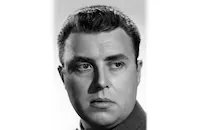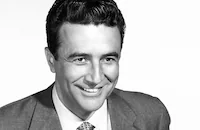Day of Triumph
Cast & Crew
Irving Pichel
Lee J. Cobb
Robert Wilson
James Griffith
Ralph Freud
Everett Glass
Film Details
Technical Specs

Synopsis
In Jerusalem, during the eighteenth year of the reign of Tiberius Caesar, a group of Zealots led by Zadok, a spice merchant, is attempting an uprising against the Romans. When Zadok summons leaders of the Zealot Brotherhood from all over Judea, they expect to be told when to attack the Romans, but instead Zadok, and his aide Andrew, tell them that there will be no uprising and that they should return to their homes. Zadok and Andrew then relate recent events to the leaders: Three years earlier, Zadok and his friend, Judas Iscariot, seeking a man capable of inspiring the common people, go to the valley of the Jordan to hear John the Baptist speak. They hope that John might join their mission, but the meeting is broken up by Roman soldiers and John is arrested. Andrew, a fisherman, then relates how, months later, he and his fellow fishermen Simon, James and John are approached by Jesus the Nazarene, who tells them that He has abandoned His work as a carpenter in order to bring mankind hope. After saying that the Kingdom of God is close at hand, Jesus invites them to follow Him. Andrew also speaks of having seen Jesus heal people. Jesus' followers grow in number and include the ambitious Judas who, after witnessing miracles and the effects of Jesus' teachings, informs Zadok that Jesus could be the leader for whom the Zealots have been searching. After Jesus and his disciples travel to Jerusalem and He preaches in the temple court, Judas tries to convince Zadok, who is primarily interested in political freedom, that Jesus' quest for spiritual freedom could be very useful to their cause if they spread the word that Jesus is the Messiah. However, Zadok forbids this as he regards Jesus as only a mortal leader. After Mary Magdalene, a wealthy prostitute, offers her servant, Cloas, jewels to sell in order to help cure her sick mother, Cloas tells her that Jesus has already cured her mother. Mary then visits Jesus, respectfully bathes His feet and is forgiven for her sins. Meanwhile, Caiaphas, the high priest, has become concerned about the number of Jesus' followers and plots to have the disciples persuade Jesus to criticize the Roman procurator, Pontius Pilate, thereby leading to Jesus' arrest. Zadok continues his account of how a fellow Zealot, Barabbas, had disobeyed his orders, raided a Roman supply caravan, was captured and is about to be executed. Zadok wants to free Barabbas and asks Judas to enlist the support of Jesus and His disciples in a protest. However, when Judas goes to talk with Jesus, he witnesses the miracle of raising Lazarus from the dead. After Zadok learns of this, he begins to wonder if Jesus might be more than mortal and may indeed be the Son of God. Judas tries to convince Zadok that Jesus could be manipulated into political activism, with all Israel united behind Him. When Jesus makes a triumphant entrance into Jerusalem, Judas stirs up the crowd to acclaim Him "The New King of the Jews," but Jesus is dismayed and vanishes. Later, Caiaphas looks on as Jesus drives the moneylenders from the Temple and becomes more concerned about the number of His followers. Zadok is disappointed that they have failed to enlist Jesus to their cause, but Judas is eager to exhort the people once more. Zadok tells him they should wait, unless Caiaphas is foolish enough to arrest Jesus, thereby giving them a cause to rally the people. Judas then betrays Jesus to Caiaphas for thirty pieces of silver and Jesus is arrested, while praying in the Garden of Gesthemane, on charges of blasphemy and sedition. He is tried at the home of one of the high priests, found guilty and taken to Pilate for sentencing. After Pilate questions Jesus, he finds Him not guilty and, as He is from Galilee, which is under Herod's jurisdiction, sends Him there. Herod returns Him to Pilate as His "crimes" were not committed in Galilee. Pilate, who is aware that Caiaphas is trying to discredit him to Tiberius Caesar, tells him that Jesus has done nothing deserving death and that he intends to chastise, then release Him. After Caiaphas warns Pilate that Jesus is opposing the will of Caesar, Pilate summons Barabbas, who has been convicted of murder and robbery, from prison and offers the assembled crowd the Passover tradition of freeing one prisoner, Barabbas or Jesus. The crowd, filled with Caiaphas' supporters, shouts for the release of Barabbas and the crucifixion of Jesus. Jesus is crucified with two others while His mother Mary, and Zadok watch and Roman soldiers play dice below His cross. Judas, realizing the enormity of his betrayal, throws the silver coins at Caiaphas' feet then kills himself. Zadok and Andrew end their account and, two days after His crucifixion, Zadok admits that he was mistaken that Jesus was the Messiah. After a follower brings news that Jesus' tomb has been opened and His body stolen, the group disbands and Andrew joins his fellow disciples at a house from which they intend to return to Galilee. Suddenly, Jesus is among them, risen from the dead. They proclaim him the Messiah and pray. "And This was the Beginning¿"

Cast

Lee J. Cobb
Robert Wilson

James Griffith
Ralph Freud
Everett Glass
Tyler Mcvey

Lowell Gilmore

Touch Connors
Anthony Warde

Peter Whitney

Joanne Dru
Toni Gerry

Rick Vallin
Keith Richards
John Stephenson
Larry Dobkin

Robert Cornthwaite
Renny Mcevoy
Wayne Taylor
Charles Waggenheim
Charlotte Fletcher
Claudia Drake
Dean Cromer
Robert Sherman
Mel Marshall
George Sawaya
Burt Kaiser
Mitchel Kowal
Tom Tamarez
Patty Lees
Cindy Lees
Leon Gill
Joyce Palmer
Art La Forest
Crew
Daniele Amfitheatrof
Daniele Amfitheatrof
Ben Bone
Larry Butterworth
Tom Coleman
John T. Coyle
Carmen Dirigo
James K. Friedrich
James K. Friedrich
Jack Goodrich
The Rev. Brian Hession
Arthur T. Horman
Theodore Joos
Ray June
The Rev. Walter K. Kerr
Spencer H. Lees
Paul Mccardle
Thomas Neff
Joyce Palmer
George J. Schaefer
Jack Voglin
Byron Vreeland
Roger Wagner
Albert Woodbury

Film Details
Technical Specs

Quotes
Trivia
Notes
The working titles of this film were Jesus and The Great Betrayal. The opening credits conclude with the following text, which is also spoken by an offscreen narrator: "This is a story of the time when all Western Civilization was enslaved by the might of Imperial Rome...From the Rhine to the Nile, from the Atlantic to the deserts beyond the Jordan, the nations bowed in helpless submission to the legions of the Empire. Yet, in every vassal state, there were men who clung to the dream of freedom, struck back at their oppressors, planned unceasingly to cast off the yoke of slavery...In the Land of Israel, those who dared were known as the Zealots."
Day of Triumph was the first, feature-length sound and color film on Christ's life. In addition to events listed in the summary above, the film includes depictions of the Sermon on the Mount and the Last Supper. While "Zadok" is a fictitious character, the Zealots were an actual group of religious and political fanatics who lived in the first century A.D.
Producer James K. Friedrich, a former Episcopalian minister, founded Cathedral Films in 1939 and produced more than fifty, non-theatrical films for exhibition in churches before forming Century Films in 1952 to make Day of Triumph for theatrical release. In a New York Times news item of July 27, 1952, Friedrich stated that he "felt the need for a stronger spiritual counter-attack upon Communism in this country." In the early 1950s, Cathedral produced several shorter films in which radio and television actor Robert Wilson, a minister's son, portrayed Christ. Wilson recreated the role in Day of Triumph. Director and former actor Irving Pichel (1891-1954) died of a heart attack two weeks after shooting of Day of Triumph was completed, on the day he was to view the first assembly of the film. This was the last film in his long career as an actor and director,
Interiors for the film were shot at the Hal Roach Studios in Culver City and areas of Southern California provided the exteriors. Chatsworth Lake and Far Lake were used to depict the Sea of Galilee and the Banks of the Jordan, while the Sermon on the Mount was shot at Vasquez Rocks.
Although listed after Touch Connors in the cast list of Variety and Hollywood Reporter reviews, Toni Gerry (as "Cloas") did not receive an onscreen credit. According to publicity materials, extra Leon Gill, who had played a townsman in Cecil B. DeMille's The King of Kings in 1927, played an identical role in Day of Triumph. The presskit stated that, in 1927, Gill earned $7.50 per day, while in 1954 he was paid $19.34 per day.
Day of Triumph May have had a premiere in Tyler, TX in mid-December 1954 before opening in Los Angeles to qualify for Academy Award consideration. A Daily Variety news item of December 15, 1954 reported that the National Catholic Legion of Decency had a mild objection to the film. The group stated that "this film representation (in part fictional) of a period in the life of Christ, is based upon a modern interpretation of the Protestant version of the New Testament. While presented in a reverent and inspirational manner, it contains variances from and omissions of spiritual and theological truth."
On February 18, 1966, a Daily Variety news item reported that Day of Triumph would be dubbed into Spanish and noted that the film had been withdrawn from U.S. distribution "after objections to its treatment of Jewish themes in the New Testament of the Bible." Producer Friedrich was quoted as saying that he still had 200 16mm and 100 35mm prints and that the film had not yet recouped its $700,000 cost.













